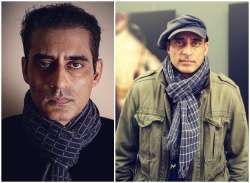Ashwath Bhatt and his acting skills - both have become striking on the silver screen. The actor's observing power is at its best and is evident from the intensity of his characters. Ashwath has played distinctive roles in films including Kesari, Raazi, Manto, Gali Guleiyan, Raaz Reboot, Phantom and Haider among others.
Speaking of what attracts him the most in a new project, he says 'a challenging character': "If there is something in the role which I have not done before, that's what excites me. I did a film with Vikram Bhatt called Raaz Reboot which was a commercial horror film but people didn't accept it. But I have respect for Vikram Bhatt as a filmmaker and the exciting part for me was to play a blind psycho person. So, I researched it and took up the challenge as an actor. As I have to be selfish and think of my filmography while choosing a role."
Ashwath Bhatt's Stagecraft Is Unmissable on the silver screen
Ashwath Bhatt revealed many more interesting details on his acting experiences, upcoming projects, typecasting an actor and etc during a telephonic interview for India TV News Digital. Following is the full interview:
You started with theatre and then got into films, what difference did it bring to your acting method?
The camera is the technical medium of cinema, thus it is very important to understand the grammar of the camera and its language. Gradually, it becomes easy for an actor to perform having knowledge of this technical medium. But apart from that, acting is acting. You have to be focused and learn your lines which is similar both in theatre as well as in the cinema.
Does performing in front of the camera (in comparison to stage-performance) bring a limitation to an actor?
The camera is a grammar of a particular language. It's not a limitation, it is sometimes beneficial. Say if you are going in for a close-up shot, then you don't have to do much. Because if you do, you put a little bit more sugar into it and it becomes very sweet which is weird. You don't overemphasize on your expression, you don't over-articulate, you try to keep it subtle. It's about amplification also. The camera is all about amplification -how you reduce and how you raise the articulation.
As an actor, what do you prefer -theatre or films?
Theatre is oxygen. Theatre is a place where you sharpen your skills. Theatre is like net practice because there are no cuts and you have to be focused for a long time. It's about concentration. While in front of the camera, you have to concentrate for a short period of time.
Also, in theatre, if one thing doesn't work, I can make it work the next time I'll do it. But in films, once it's done, it's done. It's done forever. You might crib all your life and hit your head against the wall, abb woh chap gaya toh chap gaya. You have to live with it and find peace with it.
For more entertaining stories, check out our Facebook page!

